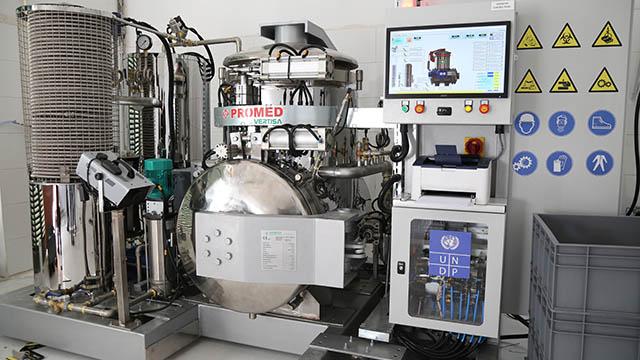You are here
UNDP introduces medical waste disposal technologies in Jordan facilities amid virus outbreak
By JT - Mar 19,2020 - Last updated at Mar 19,2020

UNDP Jordan has installed seven devices that sterilise medical waste before it goes to municipal dumping sites as part of a new project to improve medical waste disposal amid the novel coronavirus outbreak in Jordan (Photo courtesy of UNDP Jordan)
AMMAN — UNDP Jordan has introduced a project in several Jordanian healthcare facilities providing new medical waste disposal technologies to assist in combatting the spread of the novel coronavirus, according to a statement from the UN programme.
Through the project, the UNDP has installed seven medical waste sterilisation devices, known as autoclaves, which sterilise medical waste before it goes to municipal dumping sites, the statement said, adding that the UNDP has also provided 14 hospitals with Personal Protective Equipment and other materials to improve healthcare waste disposal.
Another four sterilisation units will be installed in public and military hospitals as part of the project, currently being implemented by Jordan’s Ministry of Environment and UNDP Jordan, the statement said.
The project has also provided technical support to hospitals with waste minimisation, recycling, handling, storage, transportation, treatment and disposal options and training for staff.
“Safe and effective treatment of hazardous medical waste using the latest technologies will save the lives of hospital patients, health workers and the general public,” UNDP Resident Representative Sara Ferrer Olivella was quoted in the statement as saying.
Prior to the project, medical waste was sterilised by old incineration devices that do not meet environmental performance standards, particularly the capability to control air emissions, noted the statement.
As the country faces the coronavirus outbreak, Jordan’s Ministry of Health and other hospital operators have initiated a strategy of replacing small on-site incinerators with sterilisation equipment, the statement said.
Jordan has 21 operational incineration units and 20 non-combustion medical waste treatment units, primarily autoclaves, which are machines used to carry out industrial and scientific processes requiring elevated temperature and pressure in relation to ambient pressure or temperature.
This support to Jordan’s health system comes as part of the UNDP-Global Environment Facility (GEF) partnership’s Reduction and Elimination of Persistent Organic Pollutants Project, which aims to eliminate hazardous components that adversely affect public health and the environment, according to the statement.
Related Articles
AMMAN — Over the past 27 days, 12,000 kilogrammes of medical waste was generated, the Health Ministry said on Sunday.
AMMAN — A team of civil engineering students at the Hijjawi Faculty for Engineering Technology in Yarmouk University (YU) is preparing to pa
The Ministry of Environment has completed distributing the second batch of bins and containers across the country to collect electronic waste, a government official said Monday.
















